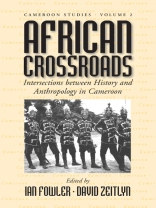Cameroon is characterized by an extraordinary geographical, cultural, and linguistic diversity. This collection of essays by eminent historians and anthropologists summarizes three generations of research in Cameroon that began with the collaboration of Phyllis Kaberry and E. M. Chilver soon after the Second World War and continues to this day. The idea for this book arose from a concern to recognize the continuing influence of E. M. Chilver on a wide variety of social, historical, political and economic studies. The result is a volume with a broad historical scope yet one that also focuses on major contemporary theoretical issues such as the meaning and construction of ethnic identities and the anthropological study of historical processes.
For more information on this title and related publications, go to
http://lucy.ukc.ac.uk/Chilver/index.html
Table des matières
Chapter 1. The Catalyst: Chilver at the Crossroads
S. Ardener
Chapter 2. The Grassfields and the Tikar
I. Fowler and D. Zeitlyn
Chapter 3. The Person, Ethnicity and the Problem of Identity in West Africa
R. Fardon
Chapter 4. Political Relations and the Eastern Marches of Adamawa in the late 19th Century
P. Burnham
Chapter 5. Mythic Transformation and Historical Continuity: the Duala of Cameroon and German Colonialism, 1884-1914
R. A. Austen
Chapter 6. Imperialisms at the Century’s End: Moghamo Relations with Bali-Nyonga and Germany 1889-1908
R. O’Neil
Chapter 7. Nso’ Military Organization and Warfare in the 19th and 20th Centuries
V. F. Fanso and B. Chem-Langhee
Chapter 8. Catholicism and Nso’ Traditional Beliefs
J. L. Banadzem
Chapter 9. ‘Pursue to Attain’: a Royal Religion
C. Tardits
Chapter 10. Political Dress: German-style Military Attire and Colonial Politics in Bamum
C. M. Geary
Chapter 11. Rebellion, Defection and the Position of the Male Cadets: a Neglected Category
J.-P. Warnier
Notes on Contributors
Bibliography
Index
A propos de l’auteur
Ian Fowler, School of Social Science, Oxford Brookes University and Queen Elizabeth House, University of Oxford












